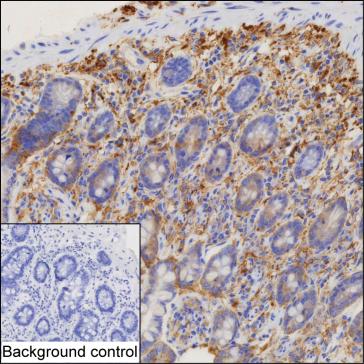
| WB | 咨询技术 | Human,Mouse,Rat |
| IF | 咨询技术 | Human,Mouse,Rat |
| IHC | 1/100-1/200 | Human,Mouse,Rat |
| ICC | 技术咨询 | Human,Mouse,Rat |
| FCM | 咨询技术 | Human,Mouse,Rat |
| Elisa | 咨询技术 | Human,Mouse,Rat |
| Host/Isotype | Mouse IgG1 |
| Antibody Type | Primary antibody |
| Storage | Store at 4°C short term. Aliquot and store at -20°C long term. Avoid freeze/thaw cycles. |
| Species Reactivity | Human |
| Immunogen | Purified recombinant fragment of human MARCKS |
| Formulation | Purified antibody in PBS with 0.05% sodium azide |
+ +
以下是3篇关于MARCKS抗体的参考文献摘要,供参考:
---
1. **文献名称**:*MARCKS regulates tumor cell migration and invasion via phosphorylation-dependent modulation of cell membrane stability*
**作者**:Chen J. et al.
**摘要**:该研究利用MARCKS特异性抗体进行免疫印迹分析,发现MARCKS蛋白通过磷酸化调节细胞膜动态,影响肿瘤细胞的迁移和侵袭能力,尤其在乳腺癌模型中表现出关键作用。
2. **文献名称**:*Targeting MARCKS in glioblastoma: A therapeutic antibody approach*
**作者**:Smith R.L. et al.
**摘要**:研究开发了一种高特异性MARCKS单克隆抗体,并通过体内实验证明其能抑制胶质母细胞瘤细胞的增殖和血管生成,提示MARCKS可能成为脑肿瘤治疗的潜在靶点。
3. **文献名称**:*MARCKS antibody-based detection of protein localization in neuronal development*
**作者**:Kim S. & Park H.
**摘要**:通过免疫荧光和免疫组化技术,使用MARCKS抗体观察到该蛋白在神经元突触形成中的动态定位,揭示其在神经发育过程中调控细胞骨架重组的功能。
---
以上文献均聚焦于MARCKS抗体的实验应用及其在疾病机制中的生物学意义。如需具体文章链接或扩展内容,可进一步提供研究方向或数据库检索关键词。
The MARCKS (Myristoylated Alanine-Rich C Kinase Substrate) antibody is a critical tool for studying the MARCKS protein, a ubiquitously expressed intracellular substrate of protein kinase C (PKC). MARCKS plays a pivotal role in cell signaling, membrane-cytoskeleton interactions, and cellular processes like migration, secretion, and neurodevelopment. It binds to calcium-calmodulin and actin filaments, regulating membrane dynamics and PKC-mediated signaling cascades. The antibody specifically detects MARCKS or its phosphorylated forms, enabling researchers to investigate its expression, localization, and post-translational modifications across various biological contexts.
MARCKS antibodies are widely used in cancer research, as MARCKS overexpression or dysregulation is linked to tumor progression, metastasis, and drug resistance. They also aid in studying neurodevelopmental disorders, inflammation, and infectious diseases where MARCKS modulates host-pathogen interactions. Common applications include Western blotting, immunofluorescence, and immunohistochemistry. Developing high-specificity MARCKS antibodies remains challenging due to structural similarities with related proteins, emphasizing the need for rigorous validation. Overall, these antibodies are indispensable for unraveling MARCKS' multifaceted roles in physiology and disease.
×